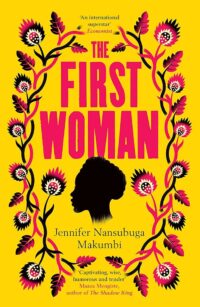Book review: The First Woman by Jennifer Nansubuga Makumbi

I’m a sucker for a coming-of-age novel. Throw in some feminism and inspiration from folklore, and I am guaranteed to pick it up. Hence my interest in The First Woman by Jennifer Nansubuga Makumbi. With a story set in Uganda from 1934 to 1983 it also covers territory I’ve learned a little about in the last couple of years but from a very different perspective.
Kirabo is raised by her grandparents in a small village in the Bugerere region of Uganda. Her family owns a lot of land and is near a good village school, which means their house is always full of cousins sent to live with them. On the brink of her teens, Kirabo is the youngest of the children and is frequently picked on or excluded by the teenagers, but she knows her grandfather Miiro will protect her from them.
What he can’t protect her from is the flying – Kirabo has begun to have out-of-body experiences when it feels like she is flying through her house or the village. The only person she can trust to help is Nsuuta, their neighbour who is widely considered to be a witch. Nsuuta was a pharmacist until she went blind and has always lived alone, so it isn’t hard to see where the witch reputation came from. Her advice to Kirabo is largely feminist teachings.
Nsuuta encourages Kirabo to collect folk stories about women. But Kirabo must keep her new adviser secret as her grandmother has forbidden her contact with their wise neighbour. The flying seems to be tied up with shame linked to puberty so it is perhaps inevitable that Kirabo grows out of it, nothing to do with Nsuuta’s teachings.
“She blinked once and next her evil self was out of her body and into the room. She flitted from room to room, like a newborn ghost lost. She flew with eyes closed because the emotion was too intense. For a long time, she swooped and darted, her mind raging over this foul body that made people spit. She swooped and darted, swooped and darted, a bat spooked in daytime.”
Kirabo’s father lives in Kampala, the big city, and visits only occasionally. No-one will tell her about her mother. Her father brought her home when he was a teenager and unmarried. There is no shame attached to Kirabo having this family history, perhaps because her grandparents’ respectability trumps all else in their village. She wonders sometimes about looking for her mother, but has no idea where to begin.
Her best friend is Giibwa, who lives in a neighbouring village and is much poorer, which sometimes causes friction between them. This friction gets worse as they get older and Kirabo catches the eye of a handsome and popular boy. Then Kirabo’s father invites her to live with him in Kampala and everything changes.
My favourite part of the novel is when Kirabo is sent to a girls boarding school. Partly because it tapped into my childhood obsession with boarding school tales. But it also lives up to the reputation I have learned from friends who attended all-girls’ schools of being a hotbed of feminism and political awareness.
“Tom’s wealth did not amount to much. The fact that it could be packed in boxes, loaded on to a lorry and driven away was disconcerting. You would never wrap up Grandfather’s wealth that way. Yet people in Nantetta who lived in houses they owned, built on their own land, who produced their own food, had envied Tom because he spoke English, drove a car, lived in the city and drank Cinzano. Kirabo’s eyes began to open to the fact that poverty and wealth were constructs after all.”
Kirabo’s aunt lives in Kampala at the foot of Kololo Hill, in a street previously occupied by Asians, suddenly emptied out after Idi Amin’s order that all Asians leave Uganda. Makumbi doesn’t give a lot of detail about this but does mention Kirabo’s mixed feelings. If I hadn’t read Kololo Hill by Neema Shah (and indeed A History of Burning by Janika Oza) I might have missed the passing references and I wonder how many other historical details I missed.
While Kirabo is at boarding school Uganda is suddenly plunged into civil war. At this point, the novel flashes back to 1934 when Nsuuta and Kirabo’s grandmother Alikisa were at school together – when they were best friends planning to marry the same man so they could live together forever. Kirabo determines to find out how they went from best friends to bitter enemies, hoping it might perhaps explain what went wrong with her and Giibwa’s friendship.
I thoroughly enjoyed this novel but I was a little sad that the initial stuff about flying and folklore disappears early on. I would have loved to learn more about Ugandan folklore. Clearly I need to find another book to teach me more.
Source: present from family (from my wishlist)
One Comments
Comments are closed.